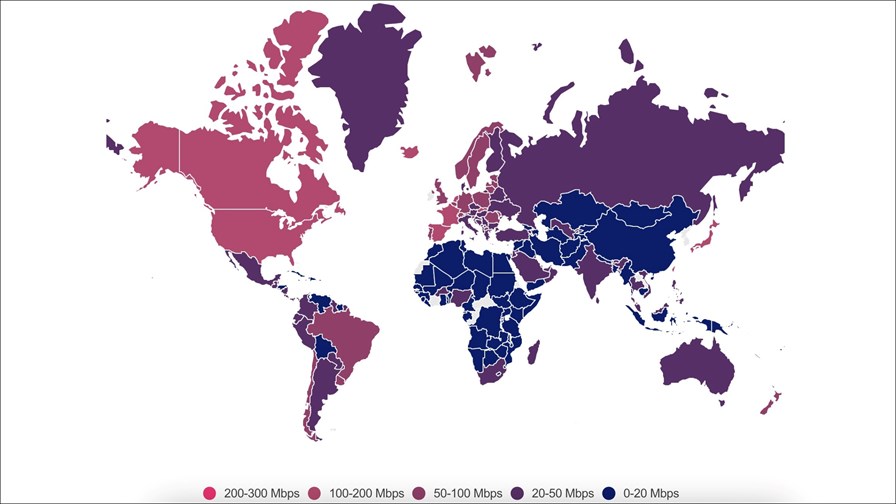
Worldwide broadband speed 2023 – source: Cable.co.uk
- The global average broadband speed has continued on a high-growth trajectory over the past year, according to new analysis
- Europe tops the chart, boosted by increased consumer uptake of fibre
- Northern Africa recorded the lowest average speed in the world by June 2023
The average broadband speed has risen by 30% globally in the 12-month period to the end of June 2023, with Europe topping the chart as fibre-to-the-premises (FTTP) continues its momentum by enticing consumers with its fast connectivity capabilities, new analysis has shown.
According to comparison site Cable.co.uk, the average download speed of broadband connectivity over the past 12 months was 46.79 Mbit/s, up from an average of 35.98 Mbit/s during the previous 12 months.
Cable.co.uk analysed data from around 1.3 billion broadband speed tests across 220 countries and territories, which was collected by Measurement Lab (M-Lab) – a consortium led by Google and the charity Code for Science and Society. The insights cover a 12-month period between mid-2022 and 30 June 2023.
Geographical breakdown
Perhaps unsurprisingly, the most developed regions in the world recorded the highest broadband internet speeds. Europe topped the chart boasting 30 of the top-50 fastest-performing countries. Notably, western Europe was well behind other parts of the continent, housing eight of the 10 fastest countries in the world for broadband. In contrast – the Baltics and eastern Europe recorded slower broadband speeds (but were still in the top five areas globally).
North America also performed well over the past year, with an average download speed of 94.02 Mbit/s.
Jersey, the largest of the Channel Islands, offered the fastest broadband speeds globally in the 12-month period with an average speed of 264.52 Mbit/s, followed by Liechtenstein (246.76 Mbit/s), Macau (231.40 Mbit/s), Iceland (229.35 Mbit/s) and Gibraltar (206.27 Mbit/s).
“It will be immediately striking to most that all of these countries share similarities. Four of the five are within western Europe, with Macau being the obvious exception. All are either small or island nations. It is much easier to roll out FTTP full fibre broadband and 5G mobile internet to a smaller population and/or across a smaller area,” explained Dan Howdle, consumer telecoms analyst at Cable.co.uk.
At the other end of the spectrum were countries in Africa, Asia and the Near East. The slowest network speeds were recorded in Afghanistan (a mere 1.71 Mbit/s), Yemen (1.79 Mbit/s), Syria (2.30 Mbit/s), East Timor (2.50 Mbit/s) and Equatorial Guinea (2.70 Mbit/s). “All of these countries suffer from underdeveloped network infrastructure and low uptake of digital services among their populations,” argued Howdle.
Collectively, countries in northern Africa had the lowest average speed in the world at 9.81 Mbit/s – a striking contrast with an average of 118.69 Mbit/s in western Europe.
The analysis also highlighted a silver lining with a decrease in the number of countries that have failed to achieve average speeds of at least 10 Mbit/s (48 countries by June 2023 compared with 67 countries in mid-2022), which indicates that “significant speed improvements are ongoing in many parts of the world”.
- Yanitsa Boyadzhieva, Deputy Editor, TelecomTV




